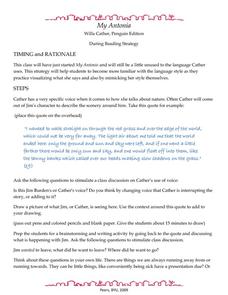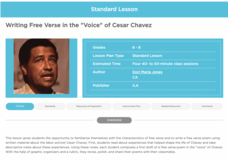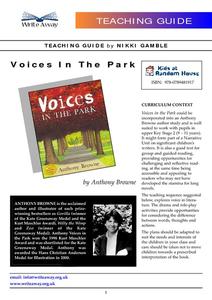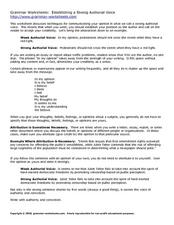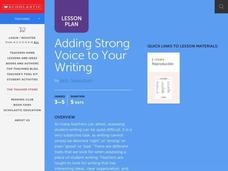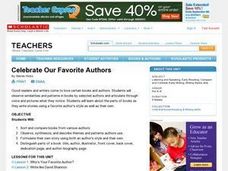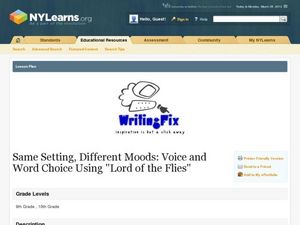Curated OER
Compare and Contrast Author's Voice
Follow the procedural details here to model for your class how to identify author's voice in two poems, "Since Hannah Moved Away" by Judith Viorst and Mirriam Chaikin's "I Hate Harry." Together, determine voice and the words that reveal...
Curated OER
Lesson 1: Author's Voice in a Poem
Second graders use the title and text clues from a poem to determine what the author's voice is. In this author's voice lesson, 2nd graders participate in a directed lesson using the poem "Amazing Bats." They discuss their feelings with...
Curated OER
Author's Voice in Passage
Students explore author's voice. For this literary elements and reading comprehension lesson, students listen to two poems about snakes (included) and identify adjectives and other descriptive words and phrases that help them determine...
Curated OER
My Antonia: During Reading Strategy
Home in on the quote on this page to explore setting, the author's and character's voices, and plot in Willa Cather's My Antonia. Pupils draw a picture of what is described in the quote, discuss the content, and make connections to their...
Thoughtful Learning
Adjusting Your Writing Voice
"Yo, what's up?" "Nuttin!" While such a dialogue might be appropriate between friends, it would be ill-advised in more formal situations. A mini-lesson asks young writers to consider how to adjust the voice they use to bring their...
National Endowment for the Humanities
The Poet's Voice: Langston Hughes and You
Middle schoolers complete a unit of lessons that explore the poetic voice of Langston Hughes. They define voice, read and analyze various poems by Langston Hughes, and complete journal entries for each instructional activity.
Curated OER
Establishing a Strong Authorial Voice, Worksheet 2
Young writers are asked to revise and modify a series of sentences to make them stronger and relay a sense of voice. No definitions or models are given. You might use the worksheet to check for understanding after a discussion of...
Curated OER
A Poem for Two Voices for Dr. Jekyll and Mr. Hyde
Poems For Two Voices are a great resource in any language arts classroom, whether you are studying poetry or not. Focusing on The Strange Case of Dr. Jekyll and Mr. Hyde, this lesson prompts young authors to write a Poem For Two Voices...
Curated OER
"Voicing" - A Believable Account with "The Glory Fields" by Walter Dean Myers
Dr. Seuss and Walter Dean Myers team up to cover the topic of prejudice. Using The Sneeches (about the culture clash between star-bellied and bare-bellied Sneetches) and The Glory Fields (about a boy coming to America on a slave ship),...
Facing History and Ourselves
Finding Your Voice
To begin a study of what it means to be American, high schoolers first consider their own identities. They draw a picture of what they think an American looks like and share their images. Next, they examine an image of the "Flag of...
ReadWriteThink
Writing Free Verse in the "Voice" of Cesar Chavez
Introduce middle schoolers to free verse poetry with a lesson that has young poets read two free verse poems and list the common characteristics of the form. They then read a passage from Cesar Chavez's biography and a free verse poem...
Write Away!
Voices In the Park
Explore the impact a narrator's point of view has on a story with a reading of the children's book, Voices in the Park by Anthony Browne. Written in four different voices, the story is told and retold from different perspectives to...
Curated OER
Structure Practice: The Passive Voice
Use this online interactive worksheet in an ELD class or for younger native speakers. They practice using simple past tense verbs in the passive voice. Many of the constructions are not straightforward, nor often used by early speakers,...
Curated OER
Voice and James Joyce
After reading a text written by James Joyce, middle and high schoolers find examples of passive voice. They share their findings with the class. Use this lesson to emphasize the effect of passive voice in writing.
Curated OER
Establishing a Strong Authorial Voice
Why do some phrases contribute to a weak authorial voice? The first page of this packet explains what a strong and weak voice sound like, and it lists some common phrases that clutter writing, ultimately weakening it. The second page...
Curated OER
Words and Phrases that Support the Author's Voice
Third graders examine the author's voice. In this author's voice lesson students read poems by Shel Silverstein. Students choose words and phrases that indicate the author's voice.
Curated OER
Style and Voice
Develop the writing skills of your high school class. Writers consider their personal style and voice, read selections by other authors, and then write pieces that challenge them to experiment with their own style.
Curated OER
Active and Passive Voice: Finding Examples Online
Incorporate technological fluency with a search for examples of active and passive voice in online resources. Discuss how use of active or passive voice influences mood or tone and contributes to author's purpose. List of...
Curated OER
"Knot" the Whole Truth: Writing a Modern-Day Story with a Tall Tale's Voice
Beyond Paul Bunyan and his blue ox, tall tales can be a great way to teach young writers about word choice and voice in their writing. Using Jerry Spinelli's Maniac Magee and the Six-Trait Writing process, they begin to write their own...
Curated OER
Author's Day
Have your learners choose an author to study. One resource link gives a list of approved authors. Scholars read at least three works produced by that author and produce three separate book reports as well as a two-page author report....
Houghton Mifflin Harcourt
Practice Book: The Boy Who Saved Baseball
An array of reading comprehension, grammar, spelling, and vocabulary activities are at your fingertips with a language arts practice packet. Second, third, and fourth graders work on various skills using reading passages and word banks,...
Curated OER
Adding Strong Voice to Your Writing
Identify examples of strong voice in popular picture books. Young authors add voice to their writing and revise their own writing. In addition, they share their writing with their peers.
Curated OER
Celebrate Our Favorite Authors
Learners read and compare and contrast a variety of books by their favorite authors. They sort books from various authors and identify themes and patterns in writing and drawings. They also create their own book in the style of their...
Curated OER
Same Setting, Different Moods: Voice and Word Choice Using Lord of the Flies
Whether it's dark, delightful, or somber, set the mood with William Golding's Lord of the Flies. High-schoolers practice descriptive writing by creating the appropriate mood for an original scene, starring one of the book's main characters.





